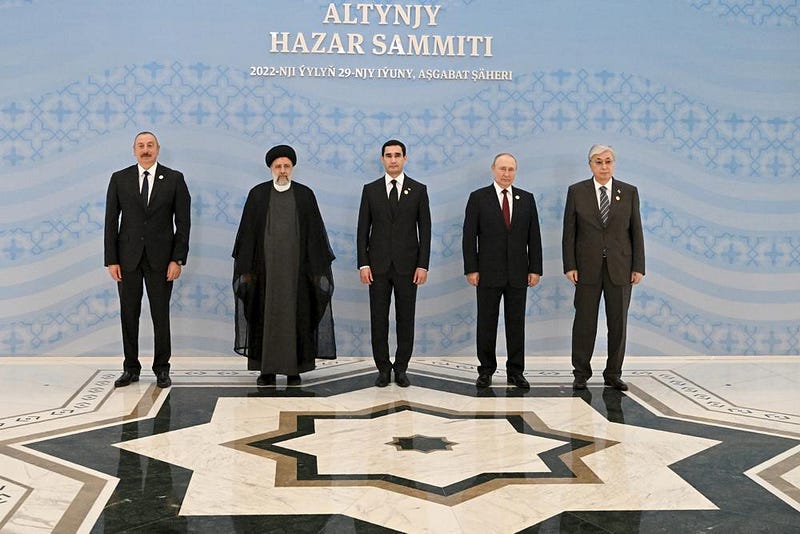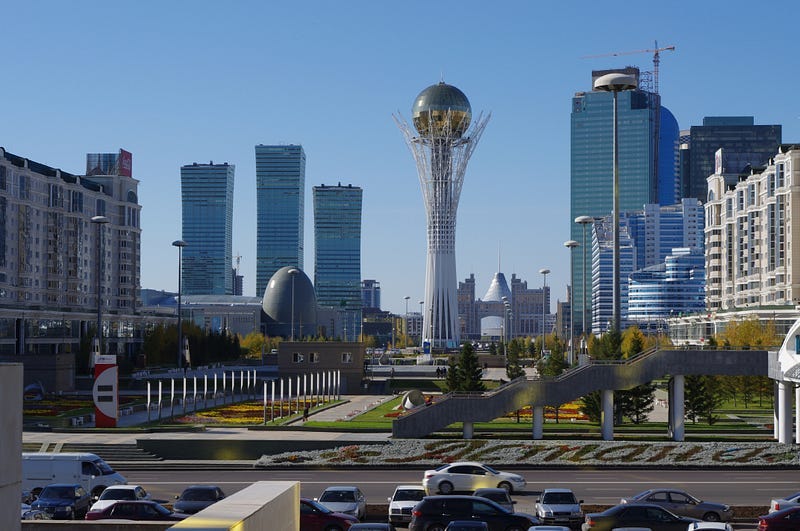Russia’s Loosening Grip on Central Asia
Kazakhstan seeks its own destiny
The war in Ukraine has completely upended the politics of Asia. In a previous piece I talked about how this year’s Shanghai Cooperation Organization (SCO) conference indicated growing division between Russia and its Asian partners. But now it’s time to take a closer look at what this means for parts of the former Soviet Union, particularly in Central Asia.
Before the war, Kazakhstan was seen as Russia’s greatest ally in the former Soviet Asia. For the last three decades of independence, Kazakhstan has unfailingly participated in all of Russia’s integration projects, such as the Commonwealth of Independent States, the SCO, the Eurasian Economic Union (EEU), and the Collective Security Treaty Organization (CSTO).
Russia for its part seeks to maintain the status quo in its relations with Kazakhstan. Its bargaining position is at a historic low, so it needs Astana to potentially share the burden of sanctions by accommodating Russian companies, allowing the export of sanctioned goods, and stopping Kazakh companies from cutting ties with Russian suppliers. It also needs Kazakhstan to continue to be the key engine for the Russian integration project, the EEU.
Russia also holds significant economic leverage over Kazakhstan, and its main source of income: its oil exports. Right now, two-thirds of Kazakhstan’s oil exports go through pipelines operated by the Russian-owned Caspian Pipeline Consortium (CPC). The CPC carries more than a million barrels per day, and shutting it down would reduce Kazakh government revenues by more than 40 percent. An alternative route to Europe through the Caspian Sea and Azerbaijan can only handle 100,000 barrels a day. So, Astana still must consider Moscow in its decision-making. Russia’s intervention to stabilize the rebellion in Almaty in January underscores this but also incentivizes Astana to try to loosen Moscow’s grip.
Since independence in 1991, Kazakhstan’s main foreign-policy priority has been reducing Russia’s influence and building ties with the rest of the world. Every conflict that Russia has had on its western borders in Georgia and Ukraine has only confirmed Astana’s belief that this is the correct path. Kazakhstan has never recognized Abkhazia, South Ossetia, or other Russian buffer quasi-states and has not acknowledged Crimea as part of Russia so as not to indirectly legitimize Moscow’s potential attempts to act the same way with Kazakhstan.
Since the launch of Russia’s full-scale invasion of Ukraine in February, and after a revolution installed a more nationalist, pro-democracy leader, Kazakhstan has attempted to quietly dismantle its alliance with Russia. No major official in Kazakhstan has expressed support for Russia since it invaded Ukraine in February. Instead, Kazakh President Kassym-Jomart Tokayev has openly refused to support Russia.
However, with the obvious weakness shown by Russia’s abject failure to achieve its goals in Ukraine, the Kazakhs are being more aggressive and public in defiance of Moscow.
Kazakhstan has not recognized the self-proclaimed republics in Ukraine’s Donbas region and is not helping Russia circumvent economic sanctions. In fact, by striking a deal with Azerbaijan to transport their oil across the Caspian Sea, bypassing Russian land-based pipelines, Kazakhstan is actively undermining Russia’s economy. Domestically, Kazakhstan has repressed support for the Ukraine war by banning Russian military propaganda symbols and canceling the May 9 Victory Day parade (celebrating the Soviet victory in World War II).
And while Kazakhstan refuses to support Russia’s military campaigns, it has been less reticent on the dispute between Azerbaijan and Armenia over the Nagorno-Karabakh region. Although the Azerbaijani army defeated Kazakhstan’s CSTO ally Armenia in 2020, Tokayev congratulated Azerbaijani President Ilham Aliyev on “restoring the territorial integrity” of his country.

Economics also played a major role in this diplomatic overture. Although none of the alternative routes for Kazakh oil exports can match the CPC pipeline, Kazakhstan needs freedom to maneuver in its export routes. One of the possible alternatives is via the port in Baku, the capital of Azerbaijan. For this reason, the two parties agreed to intensify their economic cooperation. After observing Russia’s attempted coercion of Europe using its natural gas exports, there is no doubt Russia would try the same tactics against its Central Asian “allies”.
In yet another diplomatic effort to signal distance from Russia, President Tokayev visited Turkey in May for the first time since his inauguration. The parties boosted their relationship to the level of a strategic partnership, and Turkey agreed to produce drones for Kazakhstan’s military. But more importantly, Kazakhstan agreed to exchange military intelligence with Turkey, a NATO member.
Pro-Russian media has claimed that Kazakhstan has gone so far as to supply Ukraine with arms. Kazakhstan officially rejects those allegations, but the fact that the allegation seems plausible is evidence Kazakhstan is communicating its distance from Russia. The deeper Moscow digs itself into a confrontation with the international community while incurring battlefield losses, the more aggressive Kazakhstan and the other Central Asian nations will be in ditching Russia where possible.
Are the Kazakh’s concerns about Russia trying to dominate them like they did Ukraine valid? Let’s see what the Russians themselves have said. In March, Sergey Savostyanov, a Moscow city parliament deputy, suggested including Kazakhstan in a “demilitarization and denazification zone”. In August, Dmitry Medvedev, the deputy chairman of Russia’s Security Council and former Russian prime minister, suggested in a social media post that after Ukraine, Moscow might turn its attention to the fate of northern Kazakhstan, which has a significant population of ethnic Russians.
Although it is highly unlikely Russia will launch another war on its border, the biggest downside of Kazakhstan’s newly emerging strategy toward Russia might well turn out to be the unpredictability of decision-making in the Kremlin. With Russia’s obvious military weakness, however, the Kazakhs are calculating that it’s well worth the risk to set themselves on an independent path to act in pursuit of their interests, and not in those of a weakened former colonizer.



